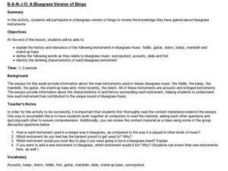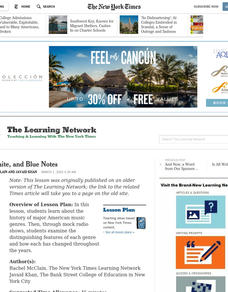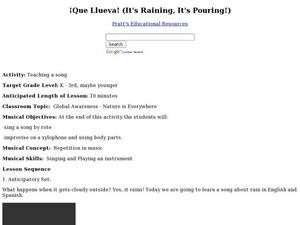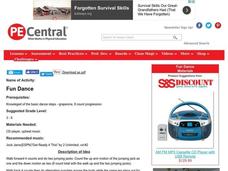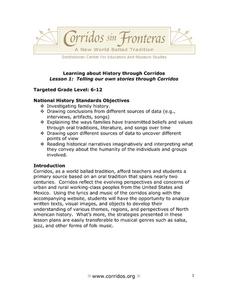Curated OER
Rhythm & Improv: Jazz & Poetry
Students analyze the elements of poetry and jazz. In this critical thinking skills lesson, students take a closer look at the rhyme, rhythm, alliteration, form, free verse, lyricism, and imagery that exist is jazz as well as poetry.
Curated OER
Song Writing
Students write an original song using music composition software such as Music Time. By doing this, students identify another use for the computer besides word processing and games.
Curated OER
B-A-N-J-O: A Bluegrass Version of Bingo
Students explain the history and relevance of the following instruments in bluegrass music: fiddle, guitar, dobro, banjo, mandolin and stand-up bass.
They identify the defining characteristics of each bluegrass instrument and participate...
Curated OER
Playing With Your Food
Students discover about the form and function of traditional musical instruments, then use this knowledge to create non-traditional instruments that replicate the sounds of traditional instruments. They use vegetables to create their...
Curated OER
"Jazz is About Collaboration": Jim Crow Laws And Segregation
Students explore development of jazz music in the 1930s by forming imaginary jazz bands which tour several cities in Depression-era America. Jazz band members create imaginary identities for themselves, develop publicity for their tour,...
Curated OER
Quarter Rest Lesson
First graders indicate the silent beats (rests) with an outward motion of the arms. They indicate a measure clapped out with a quarter rest, and a measure clapped out without a quarter rest.
Curated OER
Red, White, and Blue Notes
Students explore the history of major American music genres. Then, through mock radio shows, students examine the distinguishing features of each genre and how each has changed throughout the years.
Curated OER
Dizzy Gillespie
Students compare and contrast two songs by Dizzy Gillespie and identify elements of bebop. They construct a Web page about Gillespie and his music.
Curated OER
What Is Cool?
Students compare versions of the song, "So What," recorded by Miles Davis and Marcus Miller. They explore the Ken Burns Website to discover more about Davis and journal their thoughts about him and his music.
Curated OER
Look, Listen and Learn
Students brainstorm what they know about the performing arts and research an artist or song and its related genre. Students work in groups to create an online banner to attract peers to their performing arts genre.
Curated OER
American Rhythms
Students combine elements of music with poetry. In this creative writing instructional activity, students examine poems from a variety of authors with varying writing styles. Students explore the different elements of poetry, including...
Curated OER
Percussion Instruments and Pitch
Learners play string instruments to discover how the pitch changes on various string instruments. In this pitch lesson, students listen to video clips and play an online music game. Learners become familiar with music vocabulary.
Curated OER
For The Record
Students create a database that catalogs their music collection of CD's and tapes. They sort, analyze and print selected database records in answer to questions about their favorite music recordings and performing artists. Each student...
Curated OER
Reading Comprehension
For this reading comprehension lesson, 3rd graders read the story Treasury of Literature and complete various comprehension activities. Students answer factual questions about the story, analyze the story using a bubble map, and extend...
Curated OER
What's New?
Students act as teams of product managers for personal electronics companies. Each team evaluate new electronic devices in different product categories (such as handheld devices and portable music devices), and create product...
Curated OER
Trouble With Trolls
Students listen to The Trouble With Trolls and discuss fables. In this story elements lesson, students work on reading skills. Students participate in different reading activities.
Curated OER
All Mixed Up
Students explore the emergence of bootlegs, also known as 'mash-ups' (the combination of two songs into one), on the Internet. By researching the musical origins of songs and creating and performing their own bootlegs, students gain a...
Curated OER
Que Llueva! It's Raining, It's Pouring!
Students learn to sing a song in another language. In this music instructional activity, students learn a song about rain in English and Spanish. Students listen to the song Que Llueva in Spanish and It's Raining, It's Pouring in...
Curated OER
Moving and Grooving with Tempo:
Young scholars are able to repeat various movements. They are able to state the definition of tempo. Students are able to distinguish between a slow temps and a fast tempo. They form a circle and play the music detective game.
Curated OER
Fun Dance
Students perform a dance step in physical education class. They move to the beat of the music, counting eight beats to a set of movements. Students walk forward four counts and do two jumping jacks. They walk backwards four counts and do...
Curated OER
Passing Down Family History Through Oral Tradition: Corridos
Young scholars create and perform Corridos which are oral tradition ballads. For this Passing Down Family History Through Oral Tradition lesson, students interview family members using a predetermined list of questions. In addition,...
Curated OER
Who’s on First? Cultural Heritage
Learners explore their own heritage as they learn more about Roger Clemente. In this social studies and music lesson plan, students study cultural heritage through a study of Puerto Rican music and instruments.
Curated OER
Water Water Water - Costume Designing
Young scholars create costumes using recycled materials determined beforehand by the teacher in this High School Drama/Art lesson on costume designing. The example lesson is based around the title of "Water, Water, Water" but can be...
Curated OER
My Hero Learning Circle
Students participate in a collaboration activity. In this My Hero Project lesson, students discover what a hero is to someone halfway around the world and themselves. Over the 16-week session, circles, made up of between 6-9 classes from...




